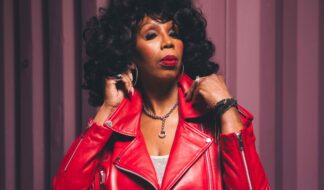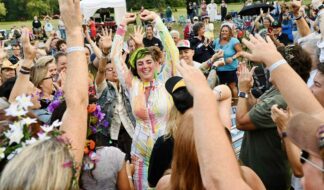by Richard Labonte
For a few years, memoirs have been the "it" book in literary queer publishing, and the trend continues – several are included in this subjective list of my 10 "best" fiction and nonfiction titles of the year. Meanwhile, there's also been a boom in young adult titles; one outstanding representative is listed. In publishing news, Suspect Thoughts went into extended hibernation, Rebel Satori's Queer Mojo imprint picked up some of the slack (and titles), Lethe Press continued to expand its wide-ranging catalogue, and Bold Strokes Books further diversified from lesbian fare into gay male titles. Meanwhile, Don Weise, formerly of Publishers Group West, Cleis Pess and Carroll & Graf, became publisher of Alyson Books, where – despite cutbacks by owner Regent Media affecting "The Advocate" – he has revived the press in a few short months.
Top 10 Fiction Titles
"Day of the Dead," by Victoria A. Brownworth, Spinsters Ink.
The title – and the cover, an array of skulls – suggests that this collection, mostly set in New Orleans, draws on a spooky underworld. It does – but Brownworth's otherworldly literary fiction digs much deeper into the horrors of the human psyche, and with far more artistry, than the supernatural norm.
"The Sky Below," by Stacey D'Erasmo, Houghton MIfflin Harcourt.
With ravishing prose – not a word wasted – D'Erasmo makes us like a selfish and manipulative yet seductive charmer. This is multi-textured, metaphorical fiction that demands an intense, careful reading, and rewards it with a dazzling vision of how a marginal man transforms his life.
"Silver Lake," by Peter Gadol, Tyrus Books.
In his sixth novel, Gadol considers issues of truths withheld, lives corroded and fidelity betrayed, a riveting rumination on the haunting complexity of love. The novel's name comes from a LA neighborhood where gays and Latinos have been part of the cultural mix for decades, geography the author weaves effectively through this luscious literary story.
"Love is the Higher Law," by David Levithan. Alfred A. Knopf.
There are two romances in this young adult novel: one between a college-bound slacker and a high school junior, whose first date in the numbing aftermath of 9/11 is a fumbled disaster; the other between the author and New York City. Levithan captures the kaleidoscope of New Yorkers' experiences on that terrible day while evoking the humble truth that love can indeed heal all.
"The Show That Smells," by Derek McCormack, Akashic Books.
This creepy gem is both grotesquely horrific and terrifically hilarious; narrative coherence is neither point nor purpose of McCormack's feverish carnival of rambunctious wordplay and hyperbole not meant for delicate sensibilities. As in: "At my vampire carnival, you'll win balloons made of babies – soft skin stretched out and stitched and blown full of air. That balloon has eyebrows!"
"Lake Overturn," by Vestal McIntyre, HarperCollins.
There is a queer misfit kid at the core of this intricate novel about a tiny Idaho town. McIntyre has crafted something far more exhilarating than a coming-out account, which is just one thread in this colorful tapestry of depressing poverty, pointless pettiness, domestic infidelities, desperate drug use, class and race divisions – and several quiet, sentimental triumphs
"The Reluctant Daughter," by Leslea Newman, Bold Strokes.
A distant daughter's angst-filled filial obligation toward her emotionally absent mother is at the heart of Newman's novel, which tackles personal vulnerability, family discord and the physical frailties and mental anguish of aging, all with intimacy and warmth.
"Blue Boy," by Rakesh Satyal, Kensington Books.
Satyal's coming-of-age story trods familiar debut-gay-novel turf, but with grace and a cultural twist. His young hero is an Indian-American who channels alienation and angst into feverish preparations to star at his school's 1992 talent show as an incarnation of the Indian deity Krishna, all while trying – and failing – to fit into an insular Indian culture's chosen-bride expectations.
"The Mere Future," by Sarah Schulman, Arsenal Pulp Press.
In this remarkable near-future novel, Manhattan is reinvented through profound social reform – a "Big Change" in which nobody is homeless and ubiquitous Starbucks has magically disappeared. Schulman injects wry political commentary and sly cultural satire into a dynamic, unconventional novel, infusing it with a futuristic gaze both sardonic and sage.
"Salvation Army," by Abdellah Taia, translated by Frank Stock, Semiotexte.
There's the novelty factor: Taia's slender autobiographical fiction is said to be the first openly gay work by a Moroccan. But this narrative – more a series of biographical sketches and sexual vignettes than a traditional novel – transcends that novelty, offering a revelatory entree to a cultural awakening that parallels the author's sexual awakening.
Top 10 Nonfiction Titles
"Cheever: A Life," by Blake Bailey, Alfred A. Knopf.
Let this incisive biography stand as an object lesson in the perils of denial. Without casting judgment, it declares that Cheever – dead more than a quarter century, his literary legacy dimmed – was a resolute alcoholic in part because of insecurity around sexual identity.
"Mapping the Territory: Selected Nonfiction," by Christopher Bram, Alyson Books.
Though best known as a terrific storyteller, this collection of 17 essays by Bram showcases insightful thinking of the sort that's all too rare – the criticism is more calm than caustic, for example, and the conversational tone charms. The next-to-last essay, an elegy for the shuttered Oscar Wilde Bookshop, is a moving lament.
"My Red Blood: A Memoir of Growing Up Communist, Coming Onto the Greenwich Village Folk Scene, and Coming Out in the Feminist Movement," by Alix Dobkin, Alyson Books.
From an elder Paul Robeson to young Bill Cosby, from folk music statesman Pete Seeger to a boyish Bob Dylan: Dobkin documents a breathtaking array of artistic friends and political comrades in this epic journey through decades of musical, feminist and sexual ferment.
"Waiting to Land: A (Mostly) Political Memoir, 1985-2008," by Martin Duberman, The New Press.
Drawn mainly from journal entries penned over a quarter century – some unapologetically dogmatic, some deliciously gossipy, some defiantly contrarian, all exhilaratingly candid – Duberman's third memoir is a vivid reminder that it once meant something to be a liberation queer.
"Bigger than Life: The History of Gay Porn Cinema from Beefcake to
Hardcore," by Jeffrey Escoffier, Running Press.
Escoffier's queer-studies gaze at gay cinematic porn is an absorbing hybrid of history and biography that skillfully charts how content and delivery have evolved over five decades, from discreet peek-a-boo thongs to the let-it-all-hang-out Internet.
"The Golden Age of Gay Fiction," edited by Drewey Wayne Gunn, MLR Press.
If there's a best of the best of 2009, this eye-opening history of gay books from before there was such a things as "gay publishing" is it. Editor Gunn and his savvy contributors have crafted a remarkable record of primarily pre-Stonewall cultural and literary history. This is a must for any serious gay reader – entertaing reading with just a touch of scholarly style.
"Smash the Church, Smash the State! The Early Years of Gay Liberation," edited by Tommi Avicolli Mecca, City Lights Books.
The personal is riotously political and the history is tangibly personal in this anthology of down-to-earth reflections on the early days of Gay Liberation. Avicolli Mecca, himself a longtime activist, has compiled a co-gendered collection that is by turns emotional, joyous, poignant – even sometimes contradictory.
"The Pure Lover," by David Plante, Beacon Press.
When a writer as profoundly able as Plante pens a lament for his lost companion, the result is a fierce encapsulation of grief, the fundamentally private wrought wrenchingly public. This sublime remembrance – more a compilation of memory fragments than a linear life story – evokes a whole man (in truth, two whole men).
"My Germany," by Lev Raphael, Terrace Books.
There is easy grace to this intense memoir about Jewish author Raphael's emotional and cultural reconciliation with Germany. Part genealogical study, part book tour travelogue and part coming-out account, the author's stark portrayal of religious, sexual and literary evolution is a compassionate record of one man's several liberations.
"Hos, Hookers, Call Girls, and Rent Boys: Professionals Writing on Life, Love, Money, and Sex," edited by David Henry Sterry and R.J. Martin, Soft Skull Press.
If you're a queer fellow, you're likely to sniff out the "rent boy" pieces in this collection of sassy, sexy and certainly informed essays by sex workers. But don't give the other 50 writers short shrift – it's the unpolished oral histories by hos and hookers concluding this collection that give the book its authentic heft.
Footnotes
There are always honorable mentions: Eleanor Lipman's "The Family Man" is a charming gay comedy of manners and parenting by a straight author who captures queer with classy writing. From a bounty of memoirs, Edmund White's "City Boy" revisits the artistic and sexual heyday of 1960s and '70s Manhattan; former "New York Times" restaurant critic Frank Bruni writes about his struggles with weight (and his lack of dates), in "Born Round"; Mary Cappello's poetic account of coping with cancer. "Called Back," is a memorable encounter with mortality; Terry Galloway's "Mean Little deaf Queer" and Stacyann Chin's "The Other Side of Paradise" are both searing accounts of the rewards at the other end of growing up hard; Jon Ginoli writes with candor of life on the road with his seminal queercore punk band, Pansy Division, in "Deflowered"; Wade Rouse copes with the rural life with morbid wit in "At Least in the City Someone Would Hear Me Scream"; and Carl Capotorto mines his coming-out past with quirky, often hilarious honesty, in "Twisted Hea ." Add to this list Paul Rudnick's memoir-istic comic riffs in "I Shudder," about growing up gay and his life in the arts, and there are plenty of fine queer lives to read about. Two works of fiction from smaller presses stand out for their style: Paul G. Bens' novel, "Kelland," and G. Winston James' story collection, "Beat the Devil," tackle issues in the gay community around sex, race, abuse and hate – but with a stunning lyrical style that invests both with a warm moral center. And one book for fun? That would be "American Hunks," edited by David L. Chapman and Brett Josef Grubisic, a century-spanning history of men and muscles.









